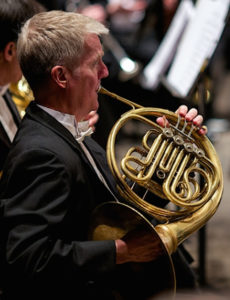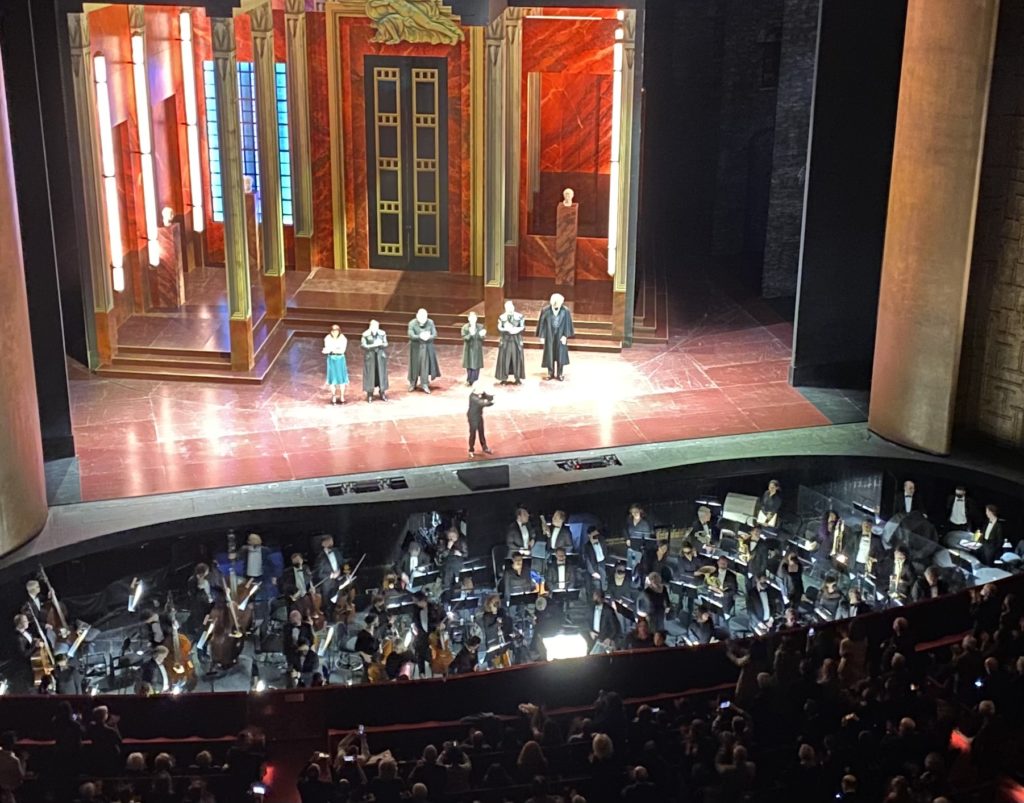
Photo credit: Terry Johnston
Now in my third term as ICSOM President, I am fortunate to have visited a number of our 53 member orchestras. As such trips were paused during the pandemic, I really am glad to be able to return to these in-person meetings, to assist in building the level of open communication that is needed between ICSOM and musician leaders.
My fall 2022 travels provided the opportunity for me to meet with delegates and orchestra committee members of the Louisville Orchestra, the Indianapolis Symphony Orchestra, the New York Philharmonic, and the Metropolitan Opera Orchestra. Coincidentally, those ICSOM orchestras reflect the groups of the four breakout sessions at last summer’s annual conference (three of them by annual budget size: under $12 million, between $12-$30 million, over $30 million; and one being a pit orchestra). In spite of the difference in size of these four organizations, one thing became apparent to me. ICSOM is here for all of our members, both in good times and in challenging times.
My breakfast meeting in Louisville, with four of their orchestra committee members, occurred on Halloween. This was the week that the Louisville Orchestra musicians would be traveling throughout Kentucky in chamber music groups, thanks to their recent state funding. Two more tours will be occurring in 2023 as part of this government grant, which will feature orchestral appearances rather than small ensembles. In addition, 2023 will be a negotiation year for the Louisville Orchestra musicians, and the challenges that they will be facing were discussed during our mealtime. We also explored how their ICSOM and AFM memberships can continue to be a resource to them.
My day in Indianapolis included three meetings, starting with lunch with their newly-elected, six-member orchestra committee. While they will not be negotiating until 2024, we discussed concerns about the Indianapolis Symphony Orchestra at the moment and how to unify their colleagues now, on the heels of their bargaining experiences during the pandemic. Afterward, ICSOM’s web designer (and ISO committee chair) Bert Witzel, and I met to explore ideas about our website, which he has been working on now for over a year. Since this meeting, ICSOM’s improved website has been launched, with a new look that is especially obvious to those who access it using mobile devices. Bravo Bert! Ideas about Senza Sordino were discussed over dinner with editor Mike Muszynski, who also gave me a tour of the ISO’s concert hall, a renovated theatre across from Monument Square which is a prime downtown location.
While I was in New York City for Integrated Media Agreement (IMA) negotiations in late November, I arrived a day early and offered to meet with our NYC ICSOM orchestras. The two who were available to meet with me during that time actually were founding members of ICSOM: the New York Philharmonic and the MET Opera Orchestra. It was not that long ago when New York City unfortunately was the hub of the pandemic, and I was encouraged to see the current rebound by these musicians during this trip. With the IMA negotiations extending into 2023, I also hope to meet with members of the NYC Ballet Orchestra in the new year.
First, I had lunch with members of the New York Philharmonic’s orchestra committee. It was noticeable that this committee is composed of newer NYP musicians, reminding me of my Senza Sordino President’s Report in the April 2022 issue (https://www.icsom.org/senzasordino/2022/04/presidents-report-the-sixties-three-ways/). Bravo to this group of younger New York Philharmonic musicians for embracing the need for the next wave of leadership within our ranks, while being able to call upon their valued veterans when needed. With their newly renovated David Geffen Hall, a newly-appointed President/CEO, and a soon-to-be-announced new Music Director, there is much excitement at the Philharmonic these days.
That evening, I had dinner with the musician leaders of the MET Opera Orchestra. Through our lively discussion, it became apparent that they truly are opera nerds. (Translation: they know this art form like it’s second nature and have firm beliefs about operatic standards and quality.) However, the MET Opera’s lengthy shut down during the pandemic was mentioned, as it plays a role in where the musicians currently are. (Remember that the size of their organization was too large for them to qualify for the federal funding that most ICSOM orchestras received.) The drastic action of a dark season has its consequences, but the professionalism of the MET Opera Orchestra musicians remains intact. At the end of the two-day IMA negotiation sessions, I was able to attend a MET Opera performance of Verdi’s Rigoletto. It was heartwarming to see these fine MET Opera Orchestra musicians in action, doing what they know and do best.
While virtually attending the “Global Joy Summit” in November 2022, I watched Presiding Bishop Michael Curry’s interview for his session “Claiming the Light in the Midst of Darkness.” Towards the end of his 45-minute talk, Bishop Curry offered this sage advice. “Whatever you do, you have got to make a qualitative difference because you were here. Something has to be better because you passed along this way.” This really made me stop for a moment to ask myself if I am living a life that is making a difference. When becoming ICSOM President in 2017, that certainly was my intention. Through meetings like these in Louisville, Indianapolis, and New York City, my aim was to listen to current concerns and offer ways that ICSOM can offer support. By doing so, my goal would go beyond what Bishop Curry stated. It is hoped that my travels will be making a difference not only to my life, but to the livelihoods of many ICSOM musicians.

The MET Opera Orchestra receives a well-deserved round of applause during the bows after a performance of Verdi’s Rigoletto in November 2022.
Photo Credit: Paul Austin





